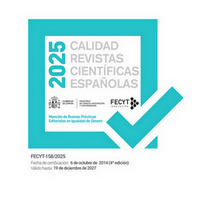National Socialist celebrations in Salamanca during the Spanish Civil War
Keywords:
national socialist ceremonies, Spanish civil war, german propagandists, falangist movementAbstract
It is studied the public speeches throughout a series of National Socialist ceremonies of a group of German envoys to the rearguard of the rebel faction in the Spanish civil war.
It is pointed out the necessity of a chronological study of National Socialist celebrations because, due to the close relationship between the internal and foreign German policy, the propagandist possibilities of Spanish war created some tension between the Nazi party envoys and the German Foreign Office employees who were in charge of the embassy; in addition, because their effectiveness had an influence on the Falangist movement.
It is explained which reasoning was used by the Germans in their speeches, distinguishing the doctrinal contents from those used to emphasize the similarities between the Spanish and National Socialist movement, to which members of the Spanish nationalist faction were addressed these speeches and other methods used, as well as how the Italians who were in Spain were also the aim of this propaganda and why it took place specially in Salamanca.
The National Socialists did not find any obstacle to display the whole power of German propaganda, which had enough impact to contribute to the recognition of the rebel faction by Britain and France (Hitler´s aim pursued) and they were very close to reach a cultural agreement with the new Spanish party. Almost every public performance in relation with these objectives was carried out by the nationalsocialists… until they ceased to be indispensable, since in the summer of 1939 began a new phase of German policy in Spain.
Downloads
Downloads
Published
Issue
Section
License
All the articles published in Investigaciones Históricas, época moderna y contemporánea will have a Creative Commons Attribution 4.0 International License (CC BY 4.0).
The journal allows the authors to retain publishing rights. Authors may reprint their articles in other media without having to request authorization, provided they indicate that the article was originally published in the journal Investigaciones Históricas, época moderna y contemporánea.



